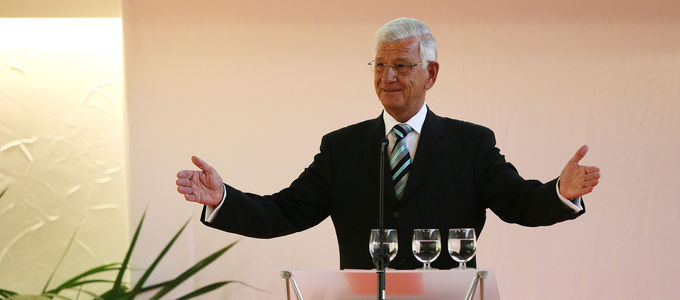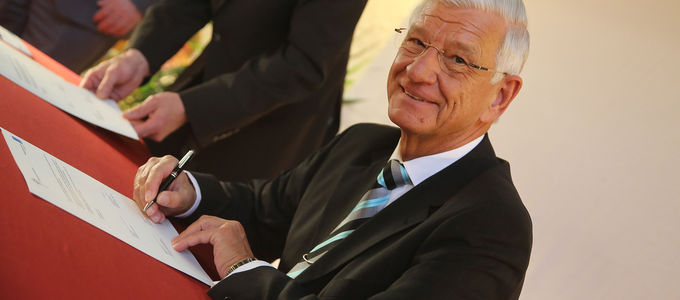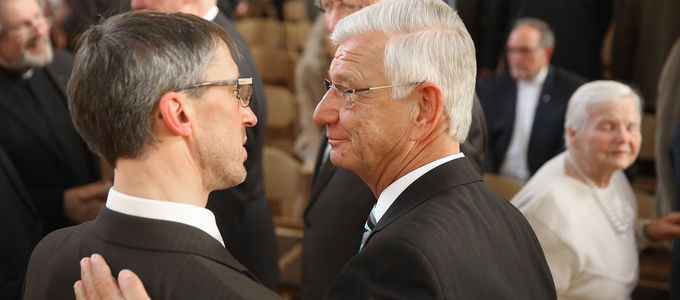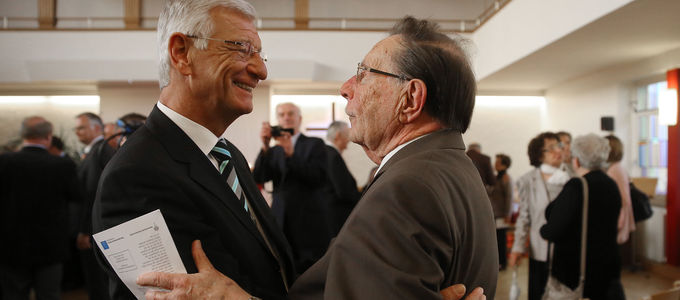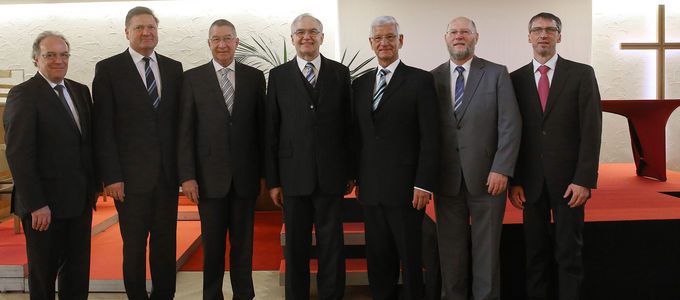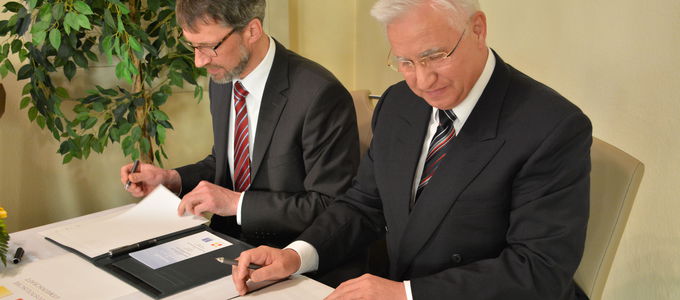
“Reconciliation is not so simple,” Apostle Rolf Wosnitzka from Erfurt in Thuringia (Germany) says. Together with others he was instrumental in bringing the reconciliation process between the New Apostolic Church and the Apostolic Community forward. How did this come about?
-

Reconciliation ceremony in Düsseldorf (29 November 2014). The participants (left to right) Bishop Ulrich Hykes (AG), District Apostle Rainer Storck (NAC), District Apostle (ret.) Armin Brinkmann (NAC), Chief Apostle (ret.) Wilhelm Leber (NAC), District Apostle Wilfried Klingler (NAC), Apostle Gert Loose (AG), and Apostle Armin Groß (AG)01
Photo: Oliver Rütten
Düsseldorf (Germany), 29 November 2014: a ceremony celebrating the reconciliation between the New Apostolic Church and the United Apostolic Church. At the end of his speech, District Apostle Wilfried Klingler stressed the urgency of reconciliation with the Apostolic congregations in Thuringia and Saxony. “In the same way, we sincerely seek to reconcile with the brothers and sisters who took a different path following the events in the year 1921 and the excommunication of the Apostles Brückner and Ecke. We would like to take a next step with them and the representatives of the Apostolic Community (Apostolische Gemeinschaft, AG), and extend our hands in reconciliation.”
Reconciliation without a detailed reappraisal of the past
Chief Apostle (ret.) Wilhelm Leber, who was closely involved in the joint talks right from the outset, adds: “Basically, this is still part of the reconciliation process that took place in 2014 in Düsseldorf, even though the context here in eastern Germany is completely different. That is why the ‘reconciliation group’ in 2014 did not consider itself the right contact. But we want to draw a line under the many years of silence now here too, and put an end to the mistrust.” As a participant in the reconciliation talks, the Chief Apostle knows that mutual trust has grown. “For me, personally, it is interesting to observe that reconciliation is possible even where one does not look too closely at the historical details. Maybe that is the key to working and living together. When the reappraisal of history loses itself in details that can be interpreted in different ways, it causes the opposite of what one hopes to achieve.”
Especially the sincere and open discussions on past failures and shortcomings sped up the process, the participants of the talks unanimously agree. “Some words or documents seem very unusual from today’s perspective,” the retired District Apostle Armin Brinkmann says, who has already participated in the talks in Düsseldorf. “You cannot trace all the historical data flawlessly and systematically. Too much time has passed, and besides, the tone at the time generally was rougher and harsher.”
“That is why we concentrated on apologising for mistakes and expressing our regret for bad decisions. In any case, we cannot change the past, but we can regret what happened,” the retired Chief Apostle summed things up.
The Christian idea of man at the centre of the debate
“Ultimately, our Christian idea of man was decisive in moving the reconciliation process forward,” District Apostle (ret.) Wilfried Klingler says. “Mutual esteem and respect for the people involved are the factors that encourage such a process. And this despite a past that is not known in detail.” The District Apostle also looks at the long road to reconciliation: “Officially, we have been on this road together since January 2000.” At that time, Chief Apostle Richard Fehr invited several Apostolic communities to Zurich for a discussion on faith. Roland Böhm from Greiz also took part in this meeting, known in the meantime as “council”. He was an Apostle in the Apostolic Community until his retirement in 2003.
Disputes are always painful
District Apostle Wolfgang Nadolny delivered the opening speech at the ceremony celebrating the reconciliation. He came as envoy of the leader of the New Apostolic Church international and as spokesman of the German District Apostles. In his speech he made clear that the official reconciliation document marks the end of a painful common past. “We have achieved reconciliation. The mission for this we received from our brothers and sisters! But instrumental was the commission of Jesus Christ, our Lord and Saviour.” Of course, the District Apostle went on, we could ask why this reconciliation took so long. His answer: “Disputes in the family are always more painful than disputes with strangers.”
There is no alternative to reconciliation
District Apostle Rüdiger Krause from Hamburg, who is responsible for the New Apostolic Church in Thuringia and Saxony (Germany), is pleased with the outcome of these talks. “Such reconciliation processes are magnificent. After all, following decades of silence joint talks managed to open up new avenues,” the Church leader says. And there is no alternative, he adds. “To say nothing at all is not a good way!
For more go to nak.org:






